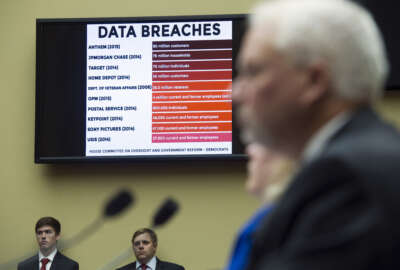To listen to the Federal Newscast on your phone or mobile device, subscribe in PodcastOne or Apple Podcasts. The best listening experience on desktop can be found using Chrome, Firefox or Safari.
- Agencies can act now to work toward closing the federal pay gap. The Office of Personnel Management plans to propose regulations encouraging agencies to stop asking job applicants for salary history. But the Department of Justice Gender Equality Network said no current policies prevent agencies from starting the process now. The advocacy group also calls on OPM to go a step further and completely ban the use of salary history. Currently, the gender and racial pay gap for feds is 5.9%. (Federal News Network)
- Federal employees affected by a data breach may be eligible for a payout. $63 million will go to federal employees and contractors with valid claims as part of a class action lawsuit. That’s after 2014 and 2015 data breaches at the Office of Personnel Management compromised some feds’ personal information. Eligible employees can receive the higher value between either $700 or the actual claim amount, up to $10,000. Those affected can go to OPMDataBreach.com to file their claims.
- One House lawmaker is looking for more details on one of the biggest known cyber attacks to ever hit the federal government. Rep. Ritchie Torres (D-N.Y.) introduced legislation that would require an investigation into the extent to which agency systems were accessed, compromised or otherwise impacted by the SolarWinds incident. Torres introduced the language as an amendment to the National Defense Authorization Act. It would require the Cybersecurity and Infrastructure Security Agency to develop the report in conjunction with the White House National Cyber Director. The SolarWinds attack was first uncovered in December 2020, and is reported to have affected nine federal agencies and 100 private sector organizations.
- An inspector general said deferred vetting for IRS hires put taxpayer data at higher risk. The Treasury Inspector General for Tax Administration found the IRS hired employees with access to sensitive taxpayer data, but have yet to verify whether those individuals are eligible for federal work. The IRS early in the COVID-19 pandemic deferred inspection of identity documents and fingerprinting requirements. TIGTA found 1,900 IRS employees hired between March 2021 and July 2021 still aren’t listed as having their identity records physically inspected by the IRS. Records for more than 100 IRS employees show they haven’t yet submitted fingerprints.
- Customs and Border Protection used facial recognition to process more than 51.1 million international travelers between 2019 and 2021. The technology helped identify 39 imposters attempting entry into the United States over the same two-year period. The Homeland Security inspector general found CBP generally complied with its own policies when using facial recognition. The agency introduced its facial biometric entry program in 2017, and it’s used at 238 international airports around the country.
- The Centers for Disease Control should redesign its data management system on airplane travelers to help improve its ability to contact trace, a new report from the Government Accountability Office finds. The CDC’s current system was developed in the mid-2000s and was not designed for the agency’s current needs to monitor public health risks. The CDC can’t quickly or accurately know the number of passengers exposed to a specific person on a plane or assess if the airlines’ response is quick enough. Therefore, the GAO made three recommendations, including for the CDC to assess ways the agency can improve the quality data it collects and increase automation of the data by adopting or establishing data exchange standards.
- The Postal Service defends a postal banking pilot, despite a lack of customers. USPS told the Postal Regulatory Commission that letting customers purchase a single-use gift card worth up to $500 using business or payroll checks as payment doesn’t count as the agency branching out into new services. USPS said it’s just allowing a new form of payment for gift cards it’s been selling for more than a decade. The USPS pilot had six customers in the first quarter of fiscal 2022, and one in the second quarter. House Republicans and industry groups have challenged the pilot since its launch last September.
- The State Department offered more details about its upcoming mega IT services contract. The State Department’s draft request for proposals for its Evolve multiple award contract will try to address the modernization of its technology across five areas. The draft RFP outlines the services vendors will provide around IT management, network and telecommunications, cloud and data centers, application development and customer and end user support. State said it expects to issue the final RFP for this contract with a ceiling of between $8 billion and $10 billion later this fiscal year. State will hold a question and answer listening session among interested vendors on July 26. Comments on the draft RFP are due by July 22.
- The Federal Emergency Management Agency welcomed four emergency management workers from state and tribal governments to participate in the agency’s new exchange program. FEMA said the Emergency Management Exchange Program will provide a new avenue to strengthen the agency’s partnerships with state, tribal and local emergency managers. It also will increase community resilience against disasters. The four participants from Maryland, Idaho and California state governments and the Choctaw Nation of Oklahoma will work with FEMA on recovery, response, climate resilience and equity assignments from July to December. Once the first part of the program ends, FEMA will send four federal employees to participating non-federal government programs from January to June.
- The Defense Department is moving nearly $1 billion of its funds to cover rising fuel costs. The Pentagon asked Congress on June 2 if it could take money from its foreign currency fluctuations in order to cover gas prices. DoD may need to request more as prices continue to stay high. The DoD comptroller told Congress in April that fuel is the most volatile cost for the military.
- Member of the Air Force may not get promoted as quickly as they hoped. The Air Force said it will slow enlisted promotions for the next two years in order to better distribute airmen across ranks. The service said it hopes to resolve some of the uneven workforce problems its been dealing with. The longer times in rank will build institutional knowledge and help train the maintenance corps. The Air Force is seeing more enlisted airmen staying in the service than in years past. The service said it sees the longer promotion times as an opportunity to build more knowledgeable airmen.
- Donna Bennett, the long-time executive at the General Services Administration, passed away July 2 at the age of 74. Bennett served as the commissioner of the Federal Supply Schedule from 2000 to 2005 before retiring. She worked for GSA for 21 years and in federal service for more than 35 years. After retiring, Bennett joined the Logistics Management Institute as a senior vice president. She worked there for eight years until fully retiring in 2013. Bennett is survived by Randy, her husband of 33 years, and their daughter Kathy Fumagalli. (Federal News Network)
Copyright
© 2024 Federal News Network. All rights reserved. This website is not intended for users located within the European Economic Area.



